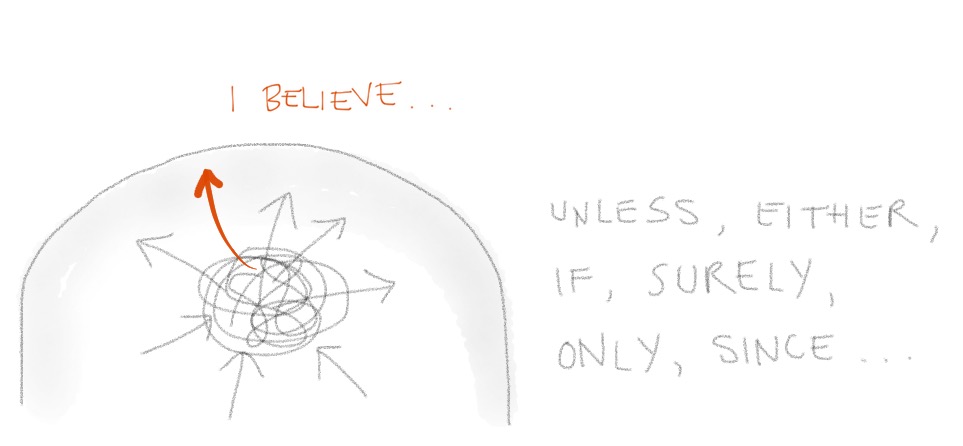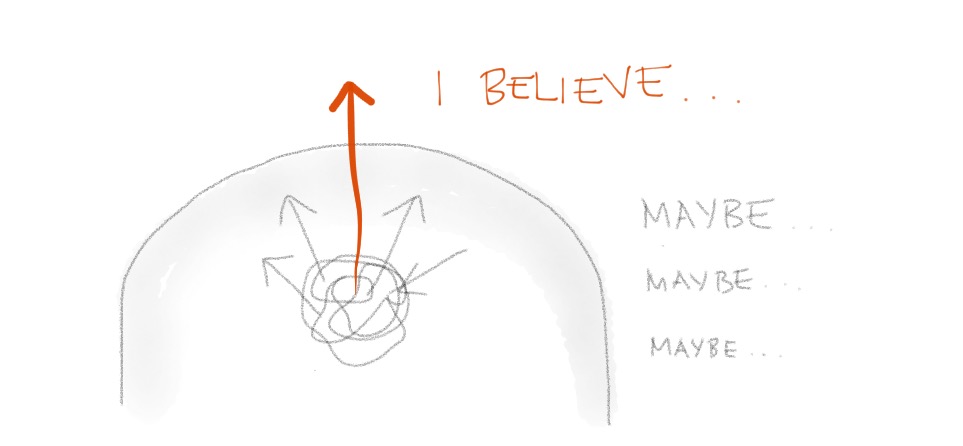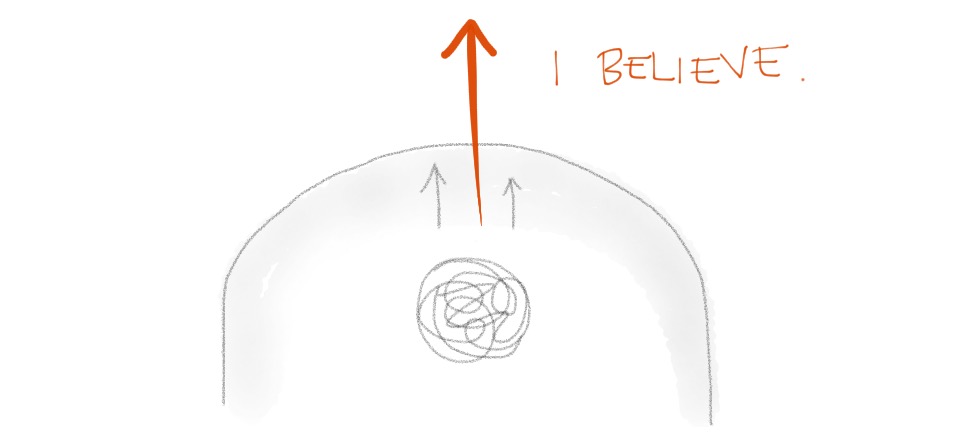Free your beliefs
Ever feel uncomfortable with a belief you hold? You might have read about something science has discovered or talked to someone with different beliefs, and that came rubbing you the wrong way somehow. When that happens, it becomes evident that your beliefs have some hold on you. We’ll see where that comes from and how to put beliefs in the place they were always meant to be.
In Christianity, we have a tall stack of beliefs. Here are some examples of the foundational ones:
- God exists
- God created the universe
- Jesus was crucified and rose from the dead
- Jesus is the one who saves us from our sins
- Jesus is present in the eucharist (the consecrated bread)
- The Bible is God’s word.
The interesting part is that these beliefs engender other, more subtle ones. They’re in the back of one’s mind, and they usually appear when challenged:
- Unless God exists, then my faith would mean nothing
- Unless I keep teaching my kids about Jesus, they’ll lose their faith
- Only the Bible is the source of truth
- Only those who have called onto Jesus as their saviour will be saved
- If I harbour a belief that’s not represented in the Bible, I’m on the wrong track
- Only by faith are we saved, not by our actions
- God is surely good because I prayed for a house and we got a good deal
- Either evolution is true or the Bible says the truth.
See all those unless’s, those ifs and those only’s? They point to more than just a belief. They point that there are mental models at work. Let me explain.
Mental models: beliefs and more
Mental models are the lenses in our minds that colour our perception. They’re generally invisible to us; since they’re fused with the way our brains store information, they have this way of passing incognito. They’re below radar, out of sight, until we learn to shine a light on them.

You can spot the existence of a mental model when you become agitated, defensive, locked into certainties, consumed by a reactive state.
Beliefs are a kind of mental model, so are biases, convictions, prejudices, conclusions, interpretations, associations, labels and oppositions. You might have heard other words for a mental model like: a paradigm, a worldview, or a narrative.
I know that I’m influenced by a mental model when I spot one of these words in my mind:
- unless
- surely
- if
- since
- only
- either
- is a
- is like
- just
- never
- always
- impossible
So let’s look at some more mental models we find in Christianity… and in skepticism too:
- It’s impossible to believe in evolution and to believe in the Bible. It’s either one or the other.
- Jesus was just a wise man…
- Unless there’s an absolute truth, then it means there’s no right and wrong.
- If God exists, and since there’s misery in the world, then surely God is either unjust or inept.
- If I start believing some claims I can’t verify in the natural world, then I’ll surely be deluding myself.
- Since there are so many religions, it’s impossible to know which one is the right one.
- It’s either all true, or all false.
- That person is an atheist.
Interesting huh? So you can find your mental models by looking out for those words (unless, either, etc.) and by noticing your state of mind (e.g. you’re in a reactionary state).
What do you do when you find a mental model at work? Do you need to remove it or correct it? Are all of them bad?
Maybe

When I find that a mental model is affecting my thoughts, limiting my options, the best way out for me is to simply answer “maybe”.
- It’s impossible to believe in evolution and to believe in the Bible. It’s either one or the other. Maybe. Maybe there’s a way to do both.
- Jesus was just a wise man… Maybe. Maybe he was more.
- Unless there’s an absolute truth, then it means there’s no right and wrong. Maybe. Maybe there’s something I can’t grasp.
- If God exists, and since there’s misery in the world, then surely God is either unjust or inept. Maybe. Maybe I’m missing something.
- If I start believing some claims I can’t verify in the natural world, then surely I’ll be deluding myself. Maybe. Maybe I’m deluding myself in other ways.
- Since there are so many religions, it’s impossible to know which one is the right one. Maybe. Maybe it’s worth giving it a try.
- It’s either all true, or all false. Maybe. Maybe some things can be both true and false and the same time.
- That person is an atheist. Maybe. Maybe that person is more than the label I attribute him. Maybe there’s some atheism inside of me too.
Answering “maybe” takes the edge off, unhinges you from the mental model that’s holding you captive, and creates new options. Answering “maybe” helps you free your beliefs.
Does that mean that freeing your beliefs puts you in a position where you’re sitting on the fence, not taking a side? Maybe. Maybe you can free your beliefs from their mental model roots and, at the same time, choose them freely and wholeheartedly.
This requires that you let go of your need for certainty. That might be difficult to do, but doing so will offer a more interesting result anyway: a modern life, grounded on measurable truth and in which faith is part of the adventure.
So let’s not fall into the trap of being fused to our beliefs. Let’s instead shine a light on our deeper mental models, clean those up, and choose to take a posture of faith: to enter freely into a relationship with our beliefs, with others, and with Christ.
